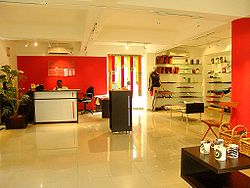- National Institute of Design
-
The article for the postgraduate campus can be found at National Institute of Design Gandhinagar and National Institute of Design Bangalore
National Institute of Design 
Established 1961 Type Autonomous National Institution Academic staff 60 Undergraduates 100 Postgraduates 240 Location Ahmedabad, Gujarat, India Campus Urban Type Design School Website www.nid.edu National Institute of Design (NID) is a design school in India. The institute functions as an autonomous body under the Department of Industrial Policy and Promotion, Ministry of Commerce and Industry, Government of India. NID is recognised by the Department of Scientific and Industrial Research (DSIR) under Ministry of Science and Technology, Government of India, as a scientific and industrial design research organisation.
Business Week has ranked NID (32 alphabetically) in its list of top design schools in the world.
Contents
Overview
NID had been set up looking at the industrial design education being imparted in Bauhaus and Ulm in Germany.
On 19 July 2004, National Institute of Design commenced the IT Integrated Design Programmes (New Media Design, Information and Digital Design, Software and User Interface Design) at the new campus in Gandhinagar. The Bengaluru campus currently hosts the last two of these three disciplines.
The animation discipline at NID has produced film makers such as Ishu Patel, Sekhar Mukherjee, Dhiman SenGupta, Prakash Moorthy, Suresh Eriyat, Vaibhav Kumaresh etc.
The Film And video Communication department has produced numerous film makers mainly working in the field of advertising like Prasoon Pandey, Pan Nalin etc.
Background
During the early years of post independence India, manifold changes were taking place in economic and social scenario and in production processes with the introduction of new technologies even in the remotest corners of the Indian sub-continent. There were at that time, great thinkers who realized that the process of development demanded a closer look at the future policies and resources that would later on determine the pattern and pace of growth envisioned for India of the future. The Industrial Policy Resolution of 1953 outlined these concerns and indicated broad guidelines. It was as result of these activities that the Government of India invited the renowned design team of Charles and Ray Eames to recommend a programme of design to serve as an aid to the newly established small industries in India. On the basis of their ground breaking and insightful document, 'The India Report', the Government of India set up the National Institute of Design in 1961 as an autonomous national institution for research, service and training in Industrial Design and Visual Communication.
Courses offered
The institute offers two kinds of courses:
- Graduate Diploma Programme in Design (GDPD)
- Post-graduate Diploma Programme in Design (PGDPD)
Post-graduate Diploma Programme in Design
This 2 to 2.5-year programme is offered in the following specific areas of specialisation in 14 design disciplines under the five faculties.
Eligibility criteria for PGDPD: Candidates having a Bachelor's degree or equivalent in the areas mentioned in each discipline below are eligible to apply. Diploma holders from premier specialised institutions are considered on par with Bachelor's Degree in certain cases.
Industrial Design
- Product Design: B.Tech, BE (Mech./Mechatronics) B.Arch.
- Transportation and Automobile Design: B.Tech, BE (Mech./Mechatronics) B.Arch.
- Furniture and Interior Design: B.Tech, BE, B.Arch., Interior Design
- Game Design: B.Tech,B.F.A., Applied Arts, B.Tech,BIT, B.Arch, Visual Communication, Mass Media, BSc. Computer Science, Child Development, Therapy, Graduates in any other area with aptitude and proven talent for Toy/Game Design and Digital Media.
- Ceramic and Glass Design: Ceramic and Glass Design/Technology, BFA, Graduates in other disciplines with experience in Ceramic and Glass fields.
Textile and Apparel Design
- Textile Design: B.F.A, Applied Arts, Textile/Handloom Technology, Textile/Knitwear/Fashion Design, Home Science (with Textile and Clothing)
- Apparel Design and Merchandising: B.F.A., Applied Arts, Textile/Knitwear/Fashion Design or graduates in merchandising or any other disciplines with proven proficiency in drawing and garment construction and presentation
- Lifestyle Accessory Design: B.F.A, B.Arch., Applied Arts, Design,Interior Design, Accessory Design and relevant disciplines in technology and engineering.
Communication Design
- Graphic Design: B.F.A, Applied Arts, B.Arch. Interior Design, graduates with experience in Graphic Design.
- Animation Film Design: B.F.A, Applied Arts, Design, B.Arch, Communication Media, Film & TV, Mass Media, Graduates with experience in Animation Industry
- Film and Video Communication: Humanities, Arts, Visual Communication, Mass Media or graduates in any other discipline with relevant work experience
IT Integrated Design
- New Media Design: B.F.A., Applied Arts, B.Tech, BIT, B.Arch, Visual Communication, Mass Media, BSc. Computer Science, BCA, (Knowledge of Scripting, Authoring and Graphic tools essential)
- Software and User Interface Design: BS (computer Science), B.Arch., BFA, B. Tech (Electronics), B.I.T., Applied Psychology, Accessory Design with relevant work experience
- Information and Digital Design: B.Arch., BFA, Applied Arts, BIT, BCA, BSc (Computer Science), Mass Media, Cognitive Psychology with relevant work experience
- Information and Interface Design: B.Arch., BFA, Applied Arts, BIT, BCA, BSc (Computer Science), Mass Media, Cognitive Psychology with relevant work experience
- Design for Digital Experience: B.Arch., BFA, Applied Arts, BIT, BCA, BSc (Computer Science), Mass Media, Cognitive Psychology with relevant work experience
Interdisciplinary Design Studies
- Strategic Design Management: Any recognised 3-year Bachelors Degree in Fine Arts, Humanities, Science or a 4-year degree in Engineering, Technology, etc. with work experience of minimum 2 years in a design or design-related organisation
- Design for Retail Experience: Any recognised 3-year Bachelors Degree in Fine Arts, Humanities, Science or a 4-year degree in Engineering, Technology, etc. with work experience of minimum 2 years in a design or design-related organisation
Campuses
- National Institute of Design, Bangalore (Research and Development campus)
- National Institute of Design, Gandhinagar (Post graduate campus)
See also
- National Institute of Design alumni
External links
- Official site - Official site
- D-Schools: The Global List - BusinessWeek
- MIT Institute of Design, Pune, Maharashtra, India
Categories:- Design schools
- Universities and colleges in Gujarat
- Education in Ahmedabad
- Educational institutions established in 1961
- Organisations based in Ahmedabad
- Indian design
- Graphic design schools
- Animation schools
Wikimedia Foundation. 2010.




